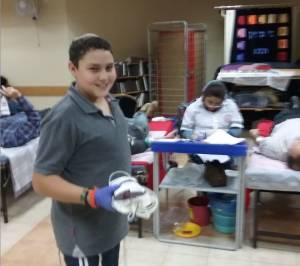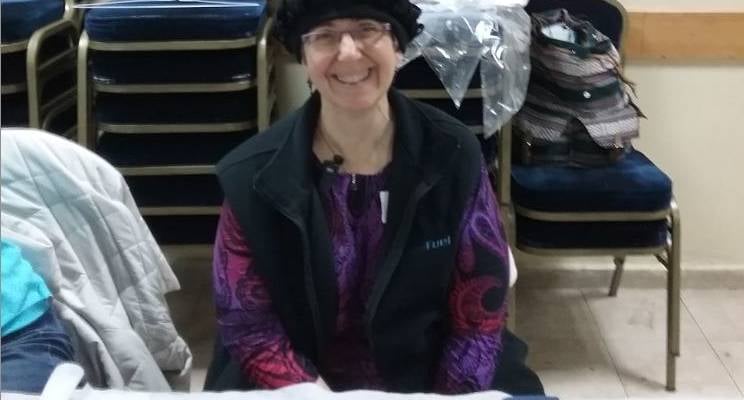American-Israeli Deborah Weisblatt, a busy professional as well as a mother and grandmother, settled in Beit Shemesh in 1995, where she established a successful blood drive a few years later.
Following is a United with Israel interview with Deborah Weisblatt.
Where are you from? When did you make Aliyah (immigration to Israel)? How many children do you have?
I was born in Jacksonville, Florida (3rd generation – my Grandma and Mom were also born there!) on February 17, 1962.
Our family (my husband and I plus our kids) made Aliyah straight to Beit Shemesh in August 1995 from Highland Park, New Jersey. We have five kids and four grandchildren. Our boys are 28 years old, our middle daughter is 25, and our “baby” twin daughters are 22.
What is your occupation? Any hobbies?
I have both a Bachelor’s and a Master’s degree in Computer Science and work as a technical writer in a hi-tech company in Herzliya.
As for hobbies – I have many! I knit and crochet (making the world a more beautiful place…one stitch at a time), sing in a women’s choir, run, bike, and participate in Rikudei Am (Israeli folk dancing).
When did you launch the Beit Shemesh blood drive? What motivated you? Has it grown significantly since the first drive?
Before Aliyah, the high-tech company where I worked invited the Red Cross a few times a year to arrange blood drives in our building complex so that we could donate and not have to leave work. They even bought kosher snacks for the observant Jewish employees. As a child, I hated needles, but as an adult, I changed my mindset and decided that if I’m healthy and can spend eight minutes with a needle in my arm to help someone who’s sick, I should get over my fear and donate blood. I faithfully attended each drive, and if my hemoglobin was high enough (I’ve been a vegetarian since age 15), I would donate.
Effort Continues with Blood Drive 3 Times a Year
When we moved to Beit Shemesh, I wanted to continue giving blood, but there was no blood donation center in the city, we had no car, and I had five little kids, so I couldn’t just leave and take a bus to Jerusalem. After a few “settling in” years, I called Magen David Adom (MDA-Israeli version of the Red Cross) in May 2001 and asked if I could arrange for them to come to Beit Shemesh. They said that all I needed to do was to get a large room with air conditioning and some juice and cookies, and they would bring the rest. So in June 2001, I arranged and sponsored the blood drive in memory of my mother. I held it at the Meyerhoff community center, and we collected 52 pints of blood.
That drive started a tradition of three drives a year – winter (Jan/Feb), spring-summer (May/June), and fall (usually the first Sunday after the High Holidays).

Beit Shemesh resident Yanai Posner, 14, has been volunteering at the blood drive for the past two years. (UWI)
My main motivation is to provide a way for people in the Greater Beit Shemesh area, including the surrounding cooperative settlements and farms, to donate without having to travel outside the city. As you can see from the statistics page, we’ve had lots of successful evenings, and others that were less successful. (The January 2016 drive, not included in the statistics page, collected 140 pints of blood.)
Besides serving cookies or bakery goods (depending on sponsorship money) and drinks, I also buy a light supper for the MDA crew (pizza or wraps) and provide coffee and tea for them. I also have an amazing committee that helps with setup and cleanup, putting up posters and advertising in local publications, managing the registration table at the drive, and helping donors with forms and to get processed as quickly as possible, shlepping food and drinks, and transporting donors who don’t have any way to get to the drive.
Each pint of blood can be used whole or split into as many as four parts – so one pint has the potential to help up to four different people!
Any comments in particular about the Beit Shemesh community?
The Beit Shemesh community is amazing! I love seeing husbands and wives, engaged couples, parents and their teenagers, and friends coming to give blood together. It’s really wonderful when 11th-12th graders reach their 17th birthday and come to donate for the first time – hopefully establishing a lifelong commitment to saving lives. In fact, many who attend have also been inspired to sign up for organ-transplant cards, and some have donated a kidney.
We try to get young men and women who are in Israel during their “gap” year to come and donate too. I think it’s especially meaningful for them to donate life-saving blood while they’re here – a direct way for them to contribute to Israel!
By: Atara Beck, United with Israel
